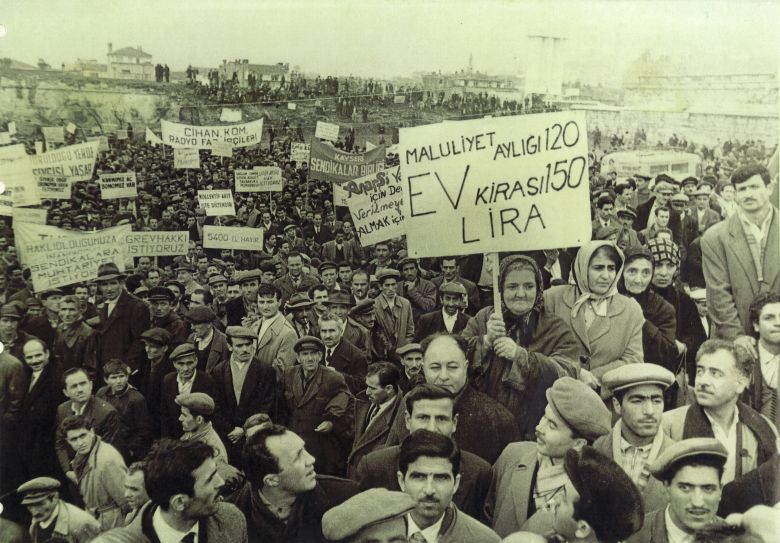Salt Research Funds Tenth Anniversary

Saraçhane Rally, December 31, 1961 (İsmail Topkar Archive)
Barış Alp Özden, “Working Class Dwellings as a Political, Social, and Ethical Issue: Reform Discussions in the 1940s and 1950s” (2018)
Barış Alp Özden, “Working Class Dwellings as a Political, Social, and Ethical Issue: Reform Discussions in the 1940s and 1950s” (2018)
Initiated in 2013, Salt Research Funds support and encourage original studies for co-learning and discussion. Marking its 10th anniversary, this year’s edition comprises a series of programs revisiting the outputs of 68 research projects supported between 2013 and 2022 through talks and published texts on Salt Blog.
PROGRAM
Text: “The Salon as a Space of Cultural Production in the Late Ottoman Period”
Nora Tataryan
Nora Tataryan, an assistant professor at Bahçeşehir University Faculty of Communication, writes about her research project supported by Salt Research Funds in 2020. The text explores the transformation of gatherings organized by women in the living rooms of their homes after the Second Constitutional Era into spaces of discussion for cultural production and the function of these literary meetings, referred to as “salons,” in the process of modernization. Tataryan presents a reading of the woman’s image in the Ottoman feminist movement. To read the full text (in Turkish), click here.
Text: “The Lost Avant-Garde: Yüksel Pazarkaya at the Stuttgart School of Concrete Poetry”
Efe Murad and Emirhan Eringen
Efe Murad, a poet-historian teaching Islamic history and writing at Wellesley College, and Emirhan Eringen, a poet-director who received his master’s degree in Visual Media Anthropology from Freie Universität Berlin, reflect on their visual archival research supported by Salt Research Funds in 2022. Their research aims to reposition Yüksel Pazarkaya, a member of the avant-garde Stuttgart School of Concrete Poetry, within the field of contemporary art and literature in Turkey through his sound poetry and performance recordings, photographs, and publications. To read the full text (in Turkish), click here.
Talk: “The Fig Tree of the Dilapidated Dome, The Ex-National Name of the Street: Historical Heritage and Urban Memory in Early Republican Istanbul (1923-1949)”
Ümit Fırat Açıkgöz
Tuesday, 11 July, 18.30, Salt Galata
In the first of the talk series, Ümit Fırat Açıkgöz, a faculty member at the American University of Beirut Department of Architecture and Design, discusses the traces of non-Muslims in the old buildings and streets of Istanbul during the early Republican period. Supported by Salt Research Funds in 2016, Açıkgöz’s topic examines the relationship between cultural heritage and urban memory, taking the physical remains of the rich and complex layers of Byzantine, Muslim, and non-Muslim histories in Istanbul as a point of departure.
PROGRAM
Text: “The Salon as a Space of Cultural Production in the Late Ottoman Period”
Nora Tataryan
Nora Tataryan, an assistant professor at Bahçeşehir University Faculty of Communication, writes about her research project supported by Salt Research Funds in 2020. The text explores the transformation of gatherings organized by women in the living rooms of their homes after the Second Constitutional Era into spaces of discussion for cultural production and the function of these literary meetings, referred to as “salons,” in the process of modernization. Tataryan presents a reading of the woman’s image in the Ottoman feminist movement. To read the full text (in Turkish), click here.
Text: “The Lost Avant-Garde: Yüksel Pazarkaya at the Stuttgart School of Concrete Poetry”
Efe Murad and Emirhan Eringen
Efe Murad, a poet-historian teaching Islamic history and writing at Wellesley College, and Emirhan Eringen, a poet-director who received his master’s degree in Visual Media Anthropology from Freie Universität Berlin, reflect on their visual archival research supported by Salt Research Funds in 2022. Their research aims to reposition Yüksel Pazarkaya, a member of the avant-garde Stuttgart School of Concrete Poetry, within the field of contemporary art and literature in Turkey through his sound poetry and performance recordings, photographs, and publications. To read the full text (in Turkish), click here.
Talk: “The Fig Tree of the Dilapidated Dome, The Ex-National Name of the Street: Historical Heritage and Urban Memory in Early Republican Istanbul (1923-1949)”
Ümit Fırat Açıkgöz
Tuesday, 11 July, 18.30, Salt Galata
In the first of the talk series, Ümit Fırat Açıkgöz, a faculty member at the American University of Beirut Department of Architecture and Design, discusses the traces of non-Muslims in the old buildings and streets of Istanbul during the early Republican period. Supported by Salt Research Funds in 2016, Açıkgöz’s topic examines the relationship between cultural heritage and urban memory, taking the physical remains of the rich and complex layers of Byzantine, Muslim, and non-Muslim histories in Istanbul as a point of departure.

